Latest News Archive
Please select Category, Year, and then Month to display items
12 January 2024
|
Story Nonsindiswe Qwabe
|
Photo Sonia Small
 Since joining the UFS in 2008, Dr Grey Magaiza has worked extensively on approaches that can foster the socio-economic transformation of societies.
Since joining the UFS in 2008, Dr Grey Magaiza has worked extensively on approaches that can foster the socio-economic transformation of societies.
“The future should be one where communities can decide on their development agenda and futures. That’s the most important for me.” Dr Grey Magaiza, Deputy Director of the Centre for Gender and Africa Studies (CGAS) and Head of the Community Development programme on the Qwaqwa Campus, is passionate about capacitating communities to be agents of change and advancement. His vision for the future emphasises the empowerment of communities to take charge of their development by actively participating in decision making and the implementation of development projects that can improve their lives.
Since joining the UFS in 2008, Dr Magaiza has worked extensively on approaches that can foster the socio-economic transformation of societies. Over the years, he has crafted his research speciality into one that he is most proud of – being an interdisciplinary scientist immersed in the development of communities.
“I’m in a fortunate position of researching what I like. I say ‘fortunate’, because I’ve taken the time to understand what I’m passionate about, which is the overall field of rural livelihoods and livelihood futures – in short, community development. My research starts from an engaged university, understanding the elements that a university must use to enhance transformation and relevance to its immediate community in terms of development.”
One of the ways he has done this is by looking at social entrepreneurship as a development approach for young people in a rural setting. Through workshops with non-profit and civic organisations in Qwaqwa, Dr Magaiza has been helping these organisations to map out their needs and actively meet them through the involvement and support of external role players.
“We understand that communities are part of the national development agenda, but even that national agenda respects community knowledge and intentions and allows communities to shape their identity. A critical enabler of this is community organising. You bring back the capacity in communities to have dialogues on issues affecting them as spaces for engagement, knowledge exchange, and for people to just talk about their way forward.”
By enabling communities to define their development agenda, they can address their specific needs, challenges, and aspirations, he said. “When I look at livelihood futures, it’s quite an exciting aspect of my work – it’s like looking into a fortune tellers’ globe, because you’re not deciding for communities what they should do, but the communities themselves take those decisions.”
Beauty personified through written word
2016-07-29

Dr Thozama April, University of Fort Hare
historian, Zubeida Jaffer, current Writer-in-Residence
in the Department of Communication Sciences
at the UFS and author of Beauty of the Heart:
The life and times of Charlotte Mannya Maxeke
and Prof Jonathan Jansen, Vice-Chancellor and Rector
of the UFS at the book launch of Zubeida Jaffer.
Photo: Rulanzen Martin
“It is quite easy to write a book in a professional capacity but very difficult to write a book from the heart.”
These were the words of Prof Jonathan Jansen, Vice-Chancellor and Rector of the University of the Free State (UFS), at the launch of Beauty of the Heart: The life and times of Charlotte Mannya Maxeke by Zubeida Jaffer, the current Writer-in-Residence in the Department of Communication Sciences at the UFS.
Perseverance and dedication yields results
Writing a book from the heart is exactly what Jaffer, an award-winning South African journalist and author, set out to do. “When you make the choice to write a story, you need to be very dedicated,” she said.
As this is Jaffer’s third book, one would think that she would have no difficulty in putting pen to paper. On the contrary, she mentioned that it was, in fact, the hardest book she has written because the narrative was not easy to get hold of.
“I wanted Charlotte’s voice to come through, and it took my team and I three years of research and writing,” she said.
Maxeke’s story helps to shape South African society
The three-person panel, hosted by the UFS Sasol Library and SUN MeDIA, and chaired by Prof Jansen, included Jaffer and Dr Thozama April, University of Fort Hare historian who had done her PHD thesis on Maxeke.
Dr April said that Maxeke’s life story is an inspiring one, as it encourages a rethinking of established narratives. “These established narratives have made it possible for historians and researchers to write about the shaping of South African society,” she said.